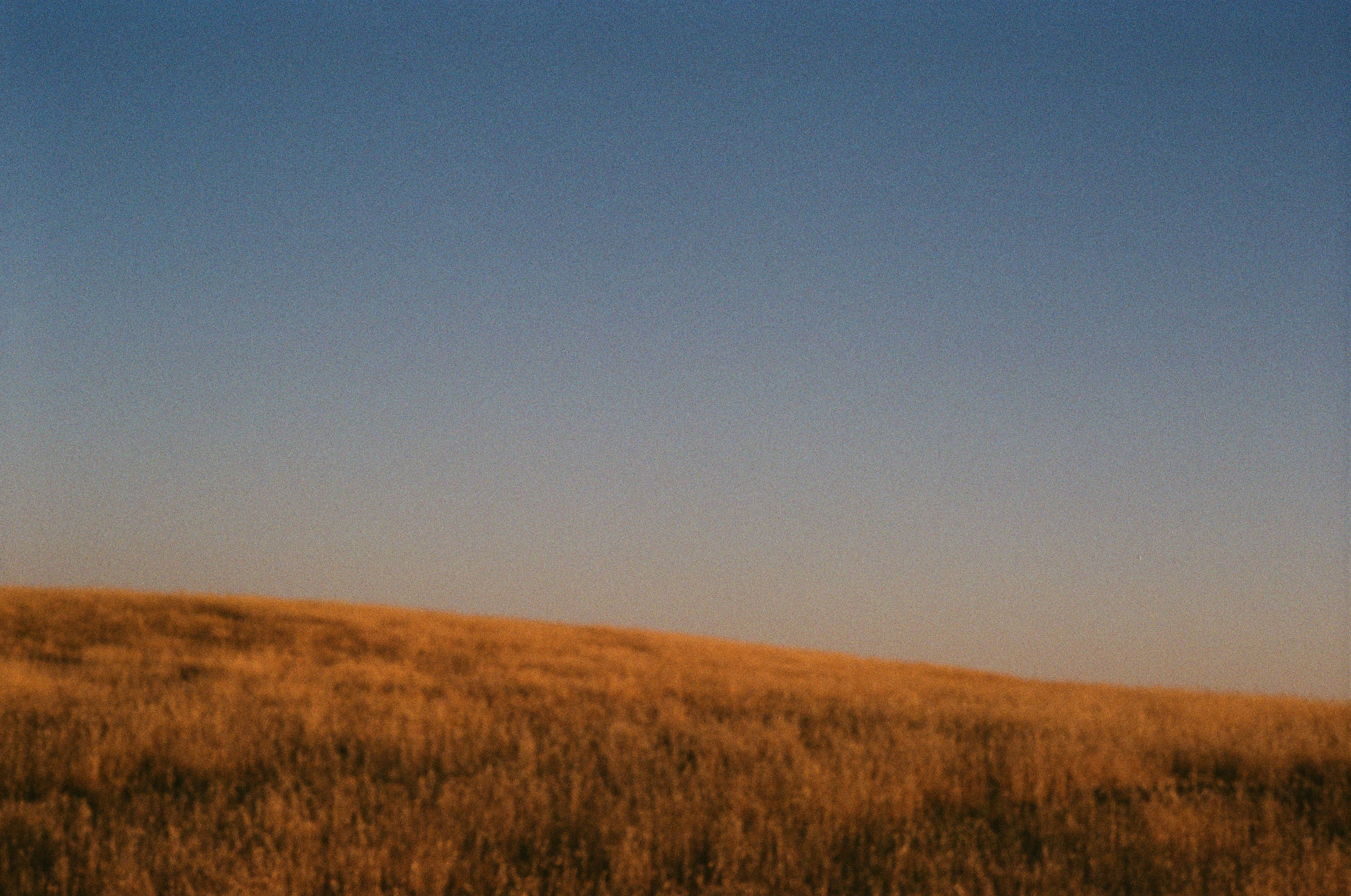Correction*, Essay
every pattern needs a passage

Sarah Biscarra Dilley
May 30, 2024
black mussels
black ants
quail
north
swordfish
horses
red ants
dogs
carrizo rabbits white earth

1
sicpats / tšiłkukunɨtš / ko’owšup
A village that evokes the liminal moment of electric blue of when sunlight dips below the horizon or rises over the eastern summit of the Temblor Range in Central California—I was called to this place in the years before starting my graduate studies, though I had only the slightest glimmer of what I was to learn here. After spending weeks reading and looking at maps, trying to make sense of the landscape that looked halfway between the moon and bleached prairie, I began making the five-hour trek from xučyu
the eagerness
of someone
too foolish
to be intimidated
by such power.
camping for days alone in the hills
I feel fear not in immensity
or the vastness of silence
but the seas of oil wells
that left me hiding my tent
and speaking aloud
to nonexistent travel companions
in the presence of extraction working
each time
a terrifying passage
through split or spilt landscapes
toward an unrivaled peace.
Understanding now, this village is a place of observation or gathering of peoples at important moments or being part of the worlds through solitude, the collapsing of time here is a complementary echo of multiplicity. It is a world-place, woven with the stories of peoples throughout valleys, across mountains, and along tributaries of language, capable of holding each in simultaneous existence, teaching us what colonialism tries to make us forget through territoriality. There are three names for this area, in three languages, each holding significance to another lesson of place and the possibility of learning to sing in continuous rounds, not speaking over one another’s knowing.

2
tsɨtqawi
A mountain made of slow-moving fire that emerges from the sea, yatknipu yakʔismašinatsʔitʸu. Held alongside power, kinships, and mounds of food for the spirits, it is named for the dogs who know a large dance house. Their social networks are entwined with ours and highlight the collectivity of prayer, health, nourishment, and abundance.
Tending a dance house of this size requires great wealth. Wealth marked through expansive and unselfish bounty.
the steadiness of stone,
dacite and
quartz and volcanic
glass
is a storied place with narratives in simultaneity
distanced from
the
warp
and
weft
of good relations,
it becomes a site
of tension
pulled taut.
every
pattern
needs
a passage.
Mounds made into middens are not refuse but the material accumulation of our generosity and spiritual strength. These too were mined like the stones from the skirt of our mountains, but they could never steal her cap made of the skies. Saltwater taffy and surfing competitions are a passing moment in the depth of eternity.
life hides in plain sight
a mountain
made
of mirrors
calls her people home.

3
tsɨtxala
Anchoring endurance, we see the relationship between coastal and inland villages, carried by hardworking beings with subterranean networks. This place held our dances longer than many other villages, made possible by kinships across languages and territories.
a cueva
becomes San Geronimo
becomes protected coastline
for journeying plovers
who make nests
among stars.
Churning tides carry the heaviness of wealth, like the immense burdens of ants, and fly with the levity of egrets in the wind.

4
tsɨtkawayu
Our village is a potent one, known by abalone sunsets, dense piñon, and the downy dampness of heavy mist. The name, a recent shift, speaks to the trafficking of herds by the Spanish, distant relations of smaller equine ancestors long sleeping. Taking caballo and making it ours, a place in the pines is kept in motion.
a clearing scent of
p e p p e r w o o d
follows
the creek
from spring
to shore,
alternating
serpentine
and gold
in the pattern
of hillsides
coastal pines with deep stories
are set to slumber without the
kiss of heat and light upon whom
the dispersal of seeds
has become reliant.
On September 10, 1769, we found the interlopers near the water, and we visited them as a group of sixty and a bear, gifting mush and fish to feed soldiers gaunt with bottomless hunger. Their assumptions shape centuries of misrepresentation, minimization, and theft but tukuski softly huffs an old song.
xuš
xuš
xuš
xuš
tɨhɨ
tɨhɨ
tɨhɨ
tɨhɨ
xuš
xuš
xuš
xuš
tɨhɨ
tɨhɨ
tɨhɨ
tɨhɨ
Our independence is marked here; in the tension with southern captains seeking to control, in the distinctness of our language, which bridges relations, in the confluence of oak and pine.

5
tissimassu
true north,
a path of piñon,
white rocks,
and salt
An arm reaches into the sea and turns all directions simultaneously.
Our mountains emerge from the sea with open sweeps like a wide embrace, mistaken for unbounded access. Relatives worked across changing contexts to maintain relationship here, from gathering place to carceral space, submerged springs to disinterred worlds. Each occupier stole more, and differently, but their structures haven’t left.
cueros carried priests
who became Picos
who sold parcels
consumed by Hearsts
collecting bodies
and soil
for profit
and university systems
and anthropology museums
or mansions
striped ones
or cattle
transformed into gifts
to the state
accumulation began with hunger;
first for land and souls,
then for meat and gold,
then for burials
and newsprint,
and wine tastings
and tourists
and wind
łhuphupismuni
łhuphupismuni
łhuphupismuni
p
o
u
r e d over mortars
crushing
carrying
chewing
we eat from
cracking stones
but they
swallow
all the fat
tannic acid
grasslands and
paths
connecting
people
pipestone
piñon
and
p r e s e n c e
we return to knowing
abundance is
generosity
relation is
responsibility
and
its lesson:
existence
a dance of landing in ourselves
and where we touch
the lives of others
we will not pay their debts
but feed everyone at our table

6
We know that the one who dances still circles here. We know the unexplainable is an affirmation of truth. We know that all of life’s existence sings a cure for death. We know this short, violent story will end because in the north, it is set—fixed in continuous motion.

7
tsɨtloqloqlo
The rich green of a creek-turned-seasonal-lagoon is a mirror and a map, along a site of exchange, powerful tides, and diplomatic shifts. This place bridges language and ecosystems, spatializing change in ways that are both tangible and at the edges of knowing.
I bathe in
cold jade
every chance that I get
remembering our names
in the softest of silt.
The word for mussels and conflict is close enough; a reminder of how feasting keeps the peace with laughter and a clattering of shells. Flush with iron and salt, we are tasked with remembering the responsibilities of confluence, the intention of relation, and the power in peacemaking. At this juncture, we turn our attention to softness or variability or movement or power. Like these waters, we find our ways back to one another.
We are healed by pleasure and embodiment,
a complete surrender to presence and change.

8

9
tsɨtqaya
Mirroring a companion in red, there is a pair for everything. Trading saltwater for currents thick with steelhead like rainbows, it is a place of harsh sun making syrupy movement or flooded valleys turning halted movement electric. When pushed from the coast, we were held among relatives over mountains and manzanita.
small black ants
appear scattered
but know what is
above
and
below,
carrying
sweetness and sustenance.

10
tsɨtkaka
Rolling hills and once-abundant oaks, we see our places made static with vineyards and dry creek beds, no trespassing signs and historic monuments to the places that ground us into unmarked graves or to the river that never stopped flowing.
repeated as Las Gallinas
in mission registers,
baptismal margins,
or the hurried last rites
of the hesitantly converted,
we place ourselves back in language
tkaka
tkaka
tkaka
reduplication is innate
in the scurrying of coveys
and occasional burst of flight
the youngest ones
follow in diligent lines,
keeping time with
the one who
wears
a
topknot.
Translation,
like knowing, is not
a unidirectional practice.

11
elewexe
Along a river that flows from the south toward the north, we find another mirror for knowing. Named for swordfish, despite its distance from the sea, elewexe connects spring water, toʔo tkmapsɨ, and salt. Mary Yee (1867–1965), a political relative through continued kinship and fluent speaker of Šmuwič—a language rooted near Santa Barbara—shares the following observation:
The Indians used to say: “All, whatever there is in the ocean is just like everything that is here on this earth. […] We are the people of this land. […] The people of the ocean are the swordfish.” Once upon a time the ocean went way out far, and suddenly they could see the houses of the swordfish. […] The house [was] sparkling in the place where the sun was shining on it
A place that held our relatives despite many attempts at removal from our rivers and shores to the north and west. Though the old stories root this place’s power, the fleeting story of settlement tells a hostile one—of incarceration, of hopelessness, of violence turned against ourselves. Our grandmother Mary’s house on Riverside stands still, with the dusty side yard used as unofficial parking for the fairgrounds that sprung up across the way and all the stories of survival that make us continue.
swordfish
anchors us
to the sea,
to northward movement,
to the truth of responsibility
to our own healing
and a stubborn dedication
to the inherent joy of being alive
it is glittering
like a cloak of abalone scales
like an inlaid socket
like the flash of spears
that call abundance to the shore
tsʔiqsaqkɨnitʸaninititʸutitʸu
feeding everyone

12
tsɨtloqloqlo
tsɨtqaya
tsɨtkaka
tissimassu
elewexe
tsɨtkawayu
tsɨtxala
tsɨtqawi
sicpats
tšiłkukunɨtš
ko’owšup
Images
1
sicpats / tšiłkukunɨtš / ko’owšup, digital photograph, March 2017.
⏎2
łisamuʔ, digital photograph, December 2023.
⏎3
tsɨtqawɨ from txɨtxala, 35mm film, December 2023.
⏎4
tsɨtkawayu sunset, 35mm film, December 2023.
⏎5
tissimassu, 35mm film, December 2023.
⏎6
Sarah Biscarra Dilley, qšiqšimu, video collage (still), 5:51, 2018-2020.
⏎7
tsɨtloqloqlo, instant photograph, 2020.
⏎8
Sarah Biscarra Dilley, qšiqšimu, video collage (still), 5:51, 2018-2020.
⏎9
tsɨtqaya, digital photograph, 2021.
⏎10
Sarah Biscarra Dilley, tqiłhismuʔ (detail), mixed media on canvas, 2024.
⏎11
elewexe (facing east), 35mm film, May 2022.
⏎12
elewexe (facing west), 35mm film, May 2022.
⏎1
Also spelled as Huichin or Huchuin in commonly used orthography, this village, in Chochenyo-speaking Ohlone homelands, includes regions in the San Francisco East Bay known as El Cerrito, Berkeley, Emeryville, Oakland, and Alameda.
⏎2
Davenport, Demorest, John R. Johnson, and Jan Timbrook. “The Chumash and the Swordfish.” Antiquity 67, no.255 (1993): 257–72. Web.
“A Chumash narrative recorded by the last [recorded] Barbareño Chumash speaker, Mary J. Yee (1897–1965), during her linguistic work with J.P. Harrington (1986) provides an insight into the importance of the swordfish in Chumash cosmology (slightly revised from translation by Beeler [MS: v. 2: 51–2])” (258).
⏎See Also
Language, Essay
Asking for Permission/Listening for Consent

Collecting, Essay
Exoticization, or the Facade of Representation
